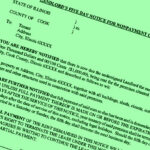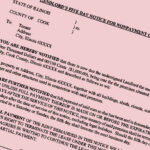I took a call recently from a prospective client who confessed to me that he thought I was a “tenant’s rights advocate”. He could not have been further from the truth.
Cook County Court closed Feb. 3, 2011
Snowmageddon 2011 takes another casualty. Just a quick note to say that the Circuit Court of Cook County will be closed on February 3, 2011. All cases from today’s closure and tomorrows are to be “rescheduled”. I’m not sure what that means just yet, but it is a downer for at least a few of … Read more
City of Chicago Vacation Rental License
Effective January 1, 2011, the City of Chicago has enacted a new business license to regulate daily/weekly rentals. The lawmakers at the City of Chicago probably had this one in mind when Chicago was in the running for the Olympics. This law will not affect “traditional” landlords, but will affect many people who rent out their real estate for short periods of time.
Tips for Illinois Landlords When Tenants Fail to Pay Rent
Renting real estate is easy, right? Well, renting the “right way” is easier than doing it the wrong way, however, there are times where the business of rental real estate goess “off track” without any fault of the landlord. In difficult economic times, more and more landlords are finding that their tenants are unable to make the monthly rent. What’s a smart, conscientious, and savvy landlord to do about it? Here are a few tips for what to do and what not to do when a tenant falls behind.
Cook County Sheriff’s Eviction Procedure
See this post for an UPDATE (September 2018). After the stay on an eviction order expires, what happens next? In Cook County, a prevailing plaintiff landlord with an eviction order is allowed to “place” the eviction order for possession with the Eviction Office of the Cook County Sheriff for civil processing. Basically, this means that two certified copies and two additional copies of the court order (obtained from the Clerk of the Circuit Court) are brought to the Sheriff’s office, a fee is paid, an “eviction disclosure form” is filled out and filed, and the eviction gets in line with the rest of the evictions waiting to be processed by the Sheriff. As of January, 2011, the Sheriff’s fee is $60.50.
February Makes One Think
 UPDATE: Click here for what happens in a leap year!
UPDATE: Click here for what happens in a leap year!
A 28 day month can cause all sorts of confusion for landlords. One of the most common methods of terminating a tenancy is the use of a landlord’s thirty day notice. This notice is used to terminate a written or oral month-to-month lease.
The thirty day notice is a strange animal. Like all of Illinois eviction law, the requirements of a thirty day notice are strict. The law for a 30 day notice can be found in 735 ILCS 5/9‑207 as follows:
What Should a Landlord do if a Tenant’s First Security Deposit & Rent Check Bounces?
In most cases, trouble with tenants usually begins some time after the tenant has paid the first month’s rent and a security deposit. There are times, however, when a tenant “breaks bad” right off the bat and bounces the initial check or checks given to the landlord.
Before getting too deep into the topic, lets examine the state of the law in Chicago.
Breaking Down the Landlord’s Five Day Notice
 The most common notice to terminate a tenancy is a five day notice. This is the notice that is generally required when a tenant fails to make timely payment of rent. The requirements for a demand for rent are contained in Section 9-209 of the Illinois Forcible Entry and Detainer Act. The act provides in part:
The most common notice to terminate a tenancy is a five day notice. This is the notice that is generally required when a tenant fails to make timely payment of rent. The requirements for a demand for rent are contained in Section 9-209 of the Illinois Forcible Entry and Detainer Act. The act provides in part:
Proper Service of an Illinois Eviction Notice
 In almost all instances, I advise my clients that an eviction notice, such as a five day notice for nonpayment of rent, be served personally on the tenant. Personal service means putting the notice in a person’s hands. Section 9-211 of the Illinois Forcible Entry and Detainer Act provides the law with respect to service of any demand or notice as follows:
In almost all instances, I advise my clients that an eviction notice, such as a five day notice for nonpayment of rent, be served personally on the tenant. Personal service means putting the notice in a person’s hands. Section 9-211 of the Illinois Forcible Entry and Detainer Act provides the law with respect to service of any demand or notice as follows:
Top Five Reasons to Have an Attorney Draft Your Lease
Leases are important business contracts. After choosing the “right” tenant, having a valid, enforceable, and favorable lease is the best protection of a landlord’s rental business. Unfortunately, a poorly drafted lease or a lease that fails to include required disclosures or legal requirements can result in a nightmare for a landlord. A written lease provides landlords certainty of the agreed upon terms that govern the landlord-tenant relationship.
Many landlords buy a lease “off the shelf”, find a form online, or borrow one from a friend. Worse, they put these leases into use without really considering the lease’s contents. When trouble brews, these landlords are often unpleasantly surprised to find that their “standard” lease does not help them and maybe even hurts their cause.
